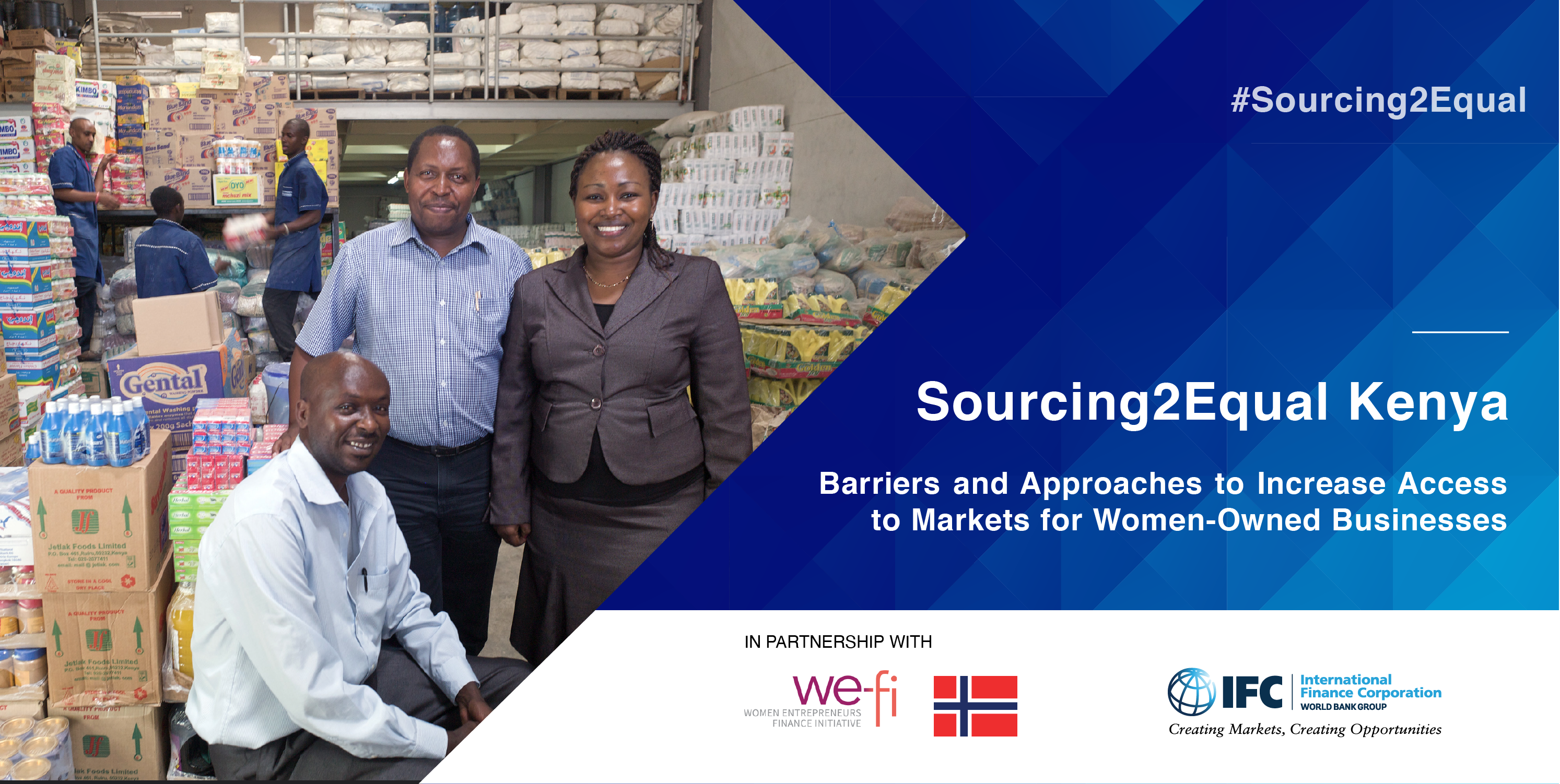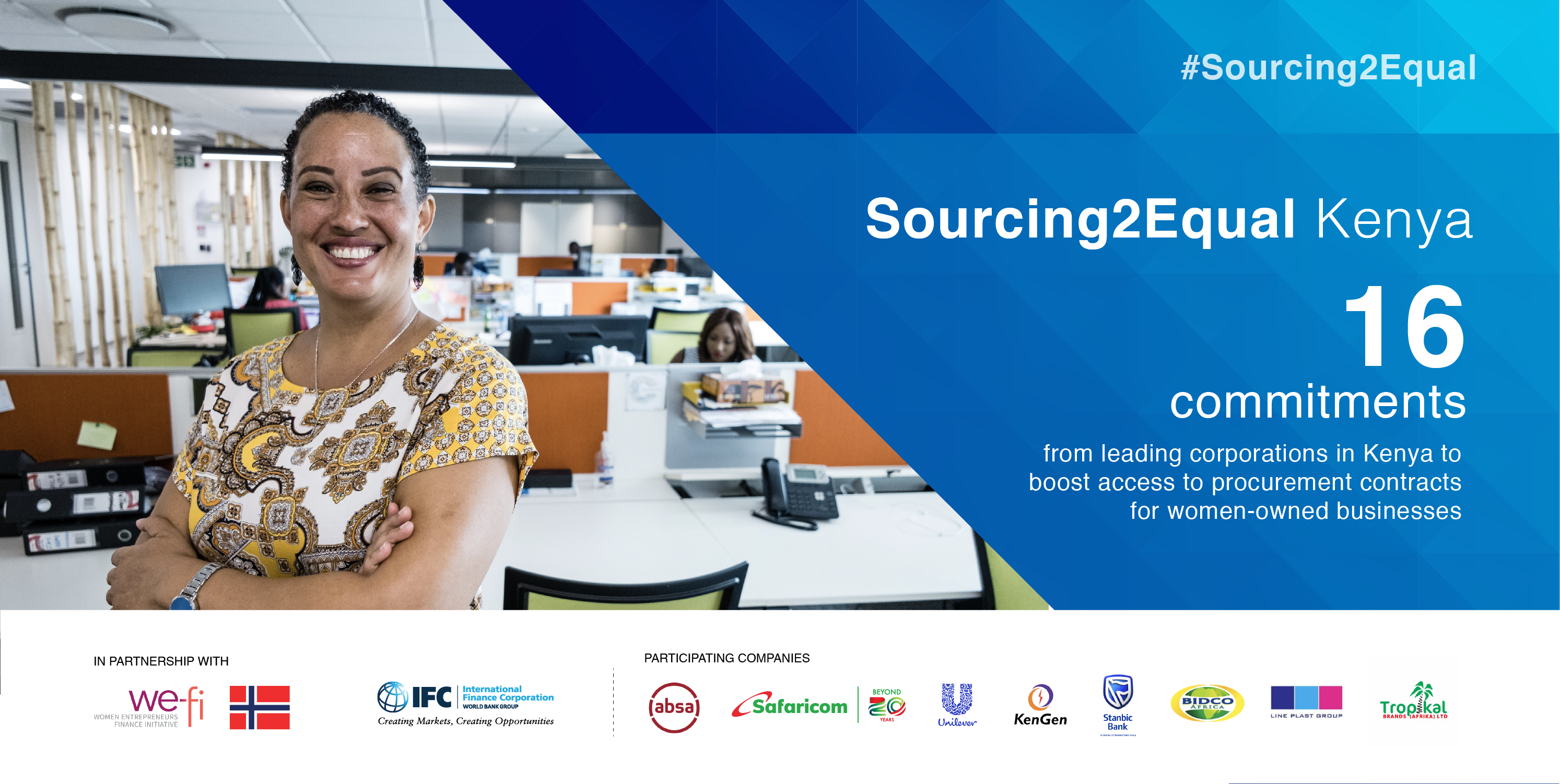
Companies commit to increase sourcing from women-owned businesses in new IFC-led program
Nairobi, Kenya, June 30, 2021—Women-owned businesses in Kenya face structural barriers that limit their ability to secure contracts with large companies for growth, according to an IFC study published today that recommends ways banks and large businesses can better support female entrepreneurs.
Commissioned as part of IFC's wider efforts to connect women entrepreneurs to new markets, the study, Sourcing2Equal Kenya: Barriers and Approaches to Increase Access to Markets for Women-Owned Businesses, found that women-owned businesses face challenges accessing finance, business networks, and market information, limiting their ability to take on large contracts.
Researchers interviewed 14 Kenyan corporations and found they spend just 3 percent of their total procurement budget on women-owned businesses—and that women entrepreneurs are mostly represented in low-value sectors, such as catering, printing, and cleaning.

The study recommends that corporate buyers partner with local financial institutions to facilitate access to working capital, implement supplier development initiatives, increase outreach to women-owned businesses, and advertise tender opportunities on digital platforms.
"For large companies, there is a business case for contracting with women-owned small and medium enterprises," said Amena Arif, IFC's Country Manager for Kenya. "A diversified supplier base is key to reducing the risk of supply chain disruptions and procurement costs."
IFC today also launched its Sourcing2Equal Kenya program to help advance gender-inclusive sourcing in the private sector and increase women's access to procurement contracts.
The program will help 10 companies increase their sourcing from women-owned businesses and build the capacity of 1,300 women-led smaller businesses to make them procurement ready.
Eight firms have already joined the program: Unilever, KenGen, Safaricom, Bidco, Stanbic Bank, Absa Bank, Line Plast Group, and Tropikal Brands.

"We set targets to increase sourcing from women-owned business because we believe it's good for business, good for economic development, and it builds a stronger equitable society," said Luck Ochieng, Unilever Kenya's Managing Director. "By participating in the Sourcing2Equal Kenya Program, we hope to develop a framework for tracking progress against our commitments and reporting on our procurement activities relating to sourcing from women-owned led businesses."
"We are working with Sourcing2Equal Kenya because it aligns with the ongoing government procurement program. The program will help us access best practices on gender-inclusive sourcing and how to implement them," said Phillip Yego, Supply Chain Director at KenGen.
In 2015, Kenya introduced a policy that stipulates that 30 percent of the value of all government procurement contracts be awarded to small businesses owned by either women, persons with disabilities, or young people between the age of 18 and 35.
The IFC study published today surveyed 571 SMEs (about 60 percent of them owned by women) and found that women face unique barriers that include limited access to capital, lack of access to resources to enhance operational capacity and limited access to networks and information on tenders.
The lack of procurement opportunities for women is not only a challenge in Kenya. Globally, less than 1 percent of procurement spending by corporate buyers goes to women-owned businesses, according to a 2017 WEConnect International report.
About Sourcing2Equal Kenya
Sourcing2Equal Kenya is the first country project under IFC's Sourcing2Equal Global program, which aims to connect 5,000 women entrepreneurs to new markets via corporate procurement by 2023. Sourcing2Equal Kenya is a three-year project implemented by IFC with the support of Norway and the Women Entrepreneurs Finance Initiative (We-Fi) to increase access to corporate procurement opportunities for women-owned or women-led businesses by addressing the barriers faced by both buyers and women-owned small and medium enterprises.
About IFC
IFC—a member of the World Bank Group—is the largest global development institution focused on the private sector in emerging markets. We work in more than 100 countries, using our capital, expertise, and influence to create markets and opportunities in developing countries. In fiscal year 2020, we invested $22 billion in private companies and financial institutions in developing countries, leveraging the power of the private sector to end extreme poverty and boost shared prosperity. For more information, visit www.ifc.org
Stay Connected
www.facebook.com/IFCwbg
www.twitter.com/IFC_org
www.youtube.com/IFCvideocasts
www.ifc.org/SocialMediaIndex
Contacts
Stay Informed
Sign up to have customizable news & updates sent to you.